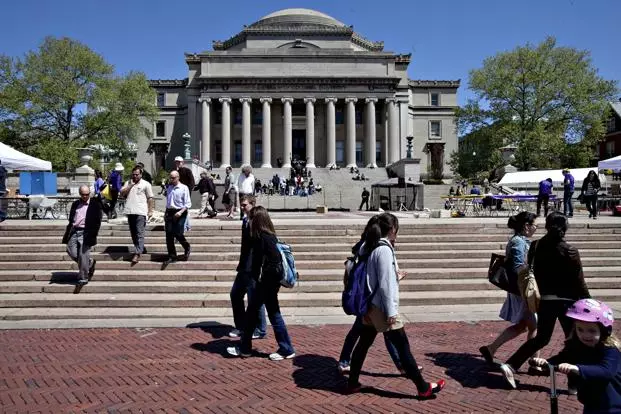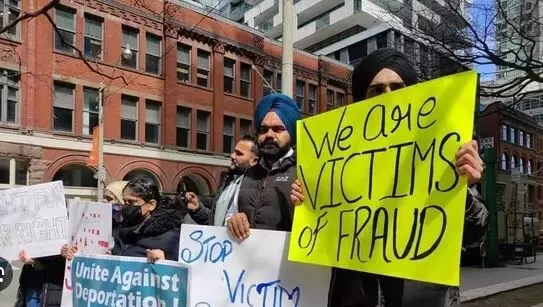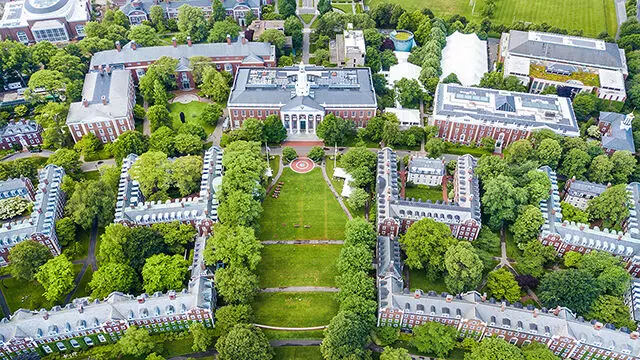
Study abroad: think before you fly
text_fieldsImage for representational purpose only
European and American countries are now the dream-lands of the young generation in Kerala. As the overseas education opportunities become more accessible, everyone wants to study abroad. Qualifications or potential do not matter. The youth of the country is taking the exit route due to several reasons. A huge world of opportunity gets opened up for those who go abroad to study with proper planning . However, the sad reality is that, the goal of many people who go abroad for study is not the education. Instead, part-time jobs and opportunities to stay in the foreign countries after study are the dream of the vast majority. The question that arises is whether the youth of Kerala have got misguided in the race after overseas education.
The number of people migrating from Kerala to study abroad has been steadily on the rise for the last few years. Central Travancore has already begun to see the effects of this. Other districts are also slowly turning into the youth-deprived districts. If the current trend continues, it won't be too long before Kerala becomes youth-less like Germany and France. This poses serious problems for the society of Kerala. There is no doubt that massive brain drain without alternatives will pull back the social progress of the country.
As a result of migration abroad, the number of unoccupied houses in Kerala is increasing at a worrying rate. According to the latest figures, the number of such houses is around 13 lakh - a serious issue that cannot be ignored in a small state like Kerala. The fact that a large number of these houses belong to people who have acquired citizenship abroad adds to the seriousness of the problem.
Undoubtedly, migration to other countries has paved the way for great economic progress in the Kerala society. Migration to the Gulf in the 1970s brought considerable economic improvement to the economically weaker families of the state. Foreign exchange worth about Rs. 2.5 lakh crore is being sent by the expatriates to Kerala every year. The economic strength that has been created through this financial inflow has strengthened the craving for the foreign education. The impact of the huge spend on studying abroad, on Kerala’s socio-economic polity is yet to be addressed properly. Surely, it has made irreparable negative impact on our economy. On an average, a child spends more than 10 lakh rupees a year on various items. The continuous depreciation of the rupee is affecting foreign spending negatively. Going by different studies, after 2012, the amount of money flowing abroad for education has increased about 13 times. Although the students recover a part of this investment through part-time jobs and the stay-back, it is far meagre compared to the volume of money going out of the country, creating a financial drain. Statistics show that 75% of those who go abroad for education do not return, leaving a huge void in families with one or two children.
More than 40,000 students from Kerala go abroad for studies annually, attracted by the material and social conditions and attractive salary in developed countries. According to the figures since 2012, this represents an increase of almost 100%. Even though social scientists and those who seriously think about the economy of Kerala talk about the worrying outflow of youth from state, the Government of Kerala claims that only four percent of the Indian students who study abroad are from Kerala. But, this seems to be a usual official claim as there are actually more Keralite students abroad. The government figures are unreliable as it does not maintain any data of the children of expatriates who go out to study in foreign countries
The reasons for the student migration merit more serious study. The phenomenal development achieved by the western world in this century and the growth in the living conditions there lure the young people who are unsatisfied with the living conditions here. Severe unemployment, lack of availability of jobs matching their qualifications, unattractive salaries for jobs and poor conditions in the education sector in Kerala disappoint the job seekers. Lack of educational institutions of International standards in our country is another reason . Only a handful of institutes like IIT, IIM, IISER, AIIMS have become competitive. Dearth of good teachers and basic facilities are major shortcomings. Lack of industries in our state and lack of an industry-driven curriculum also act as handicaps. before students. The condition of Indian universities by international rankings is not promising at all. Although there may be shortcoming in the ratings, currently only three Indian institutions are in the top 200 in the commonly relied upon QS World University Rankings.
The unregulated flow of young people abroad can be checked to some extent only if governments and voluntary organizations make a conscious effort to start high-quality educational and technical institutions that produce and train professionals in line with new realities. We should be able to use these opportunities effectively.
Unemployment in Kerala is three times the national average. This situation will not change without industrialization. Only in the fields of IT and health care are large number of job opportunities available now. Recession has slowly started affecting these sectors as well. Big IT companies have started using the potential of Artificial Intelligence and other advanced technologies to reduce the labour force.
There are many factors that influence children's career choices. The influence of those with little or no authority or expertise in career matters will lead the children to wrong choices and thereby to a dark future. There are some educational consultants who work only for profit without any social commitment. The mushrooming career guidance firms try to protect their commercial interests, making even reputable entities look suspicious. It is a fact that many of the students who choose to study abroad on the advice of such institutions suffer even without a place to live. Many experts testify that a good number of institutions in some foreign countries are on a par with the local 'parallel' colleges. There are also allegations that many of the international education rating agencies are influenced by the interests of the institutions in their countries. Many people end up in low-quality colleges in that country. Recently over 700 students from India had to face a difficult situation in Canada due to forged offer letters for admission provided by their agents. Only a prompt intervention by Government of India saved these students from punitive actions as per local laws. Thanks to the same intervention, Government of Canada has put on hold deportation order on humanitarian ground for the time being.
Students opting for foreign education have to select good institutions. Their priority should not be part-time work or stay back. Many part-time jobs which students get even affect their studies. Students should not blindly follow the opinions of rating agencies. Rather they should make a decision only after discussing details with students already studying in the desired institutes. The help of experienced guidance institutes can also be sought. Along with that, the applicants should also be ready to do a detailed study about that institution with the help of the internet and other sources. That way, many complications that may arise in the future can be avoided.
In the UK - a preferred destination for international students - a student can get legal part-time jobs on an average of 20 hours per week and can earn around £1200-1300 per month. There are people who try to make extra money by doing illegal work and get caught by the UK Home Office. Students should not trust only the agent's claim. Agents advertise that students can make a lot of money with part-time work, but little do they realise that after the cost of accommodation, food and travel, there will not be much money left as savings.
Since it is not easy to find funds to start quality international institutions requiring huge investment, the government should consider the safe future of our children and evaluate and ensure the quality and facilities of the educational institutions where foreign education seekers want to study. Accreditation and rating systems should be put in place to ensure credibility of study-abroad service agencies. Kerala government has started some steps in this direction; it has formed two expert committees to study the issues related to foreign education. Such steps will help avoid the students from being deceived.
Students who are meritorious enough to get admission in good institutions of the country generally do not go for foreign educational institutions. And students who opt for premier institutions abroad with international scholarships are exceptions. There are also many cases of students struggling to complete their studies abroad because of choosing courses beyond their ability and aptitude. To avoid such situations, exams like CUET may be tried to standardize the admission process, just like NEET being used as eligibility criteria for admission in medical courses in many foreign countries. Many people get admission in institutions which are not recognized by the Association of Indian Universities and other regulatory agencies. Such people cannot get jobs in India matching their qualification.
The problem is that many students do not care to find part-time work related to the subject of their study. This acts as a hurdle for their getting a job immediately after their studies. The British government is contemplating a bill making it mandatory for foreign students to leave the country if they don't get a job within 6 months of completing their studies in the country. This is intended to prevent back door immigration through education visas. About 40% of the 7 lakh foreign students in the UK are Indians. A good percentage of them are admitted in sub-standard universities and short term courses. It is also alleged that a large section of them are there only for the purpose of migration.
The young generation should take advantage of the opportunity to get direct admission in top-rated varsities like Cambridge and Oxfordby getting good scholarships. At least some experts are of the opinion that foreign education should not be encouraged at the degree level whereas it is beneficial to get admission in foreign universities with high quality facilities for PG, doctoral and post-doctoral studies. Be it in india or abroad, the quality of the institution is crucial. Since huge money is spent on overseas education, serious thought must be applied before taking a final decision; or else, students will be pushed to the vagaries of an uncertain future.
Racially motivated attack on Indian students in various countries is gradually increasing, which should be seriously taken up at higher levels. History of such attacks must be reviewed before opting for a country for study. A report in Hindustan Times had shown that Poland, Italy and Australia are allegedly top in the list of countries where Indian students face attack.
Care must be taken before leaving for countries in volatile regions. One must be cautious about political stability and safe borders of countries while trying to get university admission. The fate of Indian students in war-torn Ukraine is a lesson. Countries with serious border disputes, history of internal unrest and ethnic clashes are best avoided.
The New Education Policy has opened up new opportunities in international level education. Foreign universities have initiated steps to open their campuses in india. There may be negative effects of this action but not without positives. , the first being bringing international level institutions to our doorstep. It can save huge foreign exchange flowing out of country. Moreover , it will create a spirit of competition among Indian universities. Deakin University of Australia is going to open its campus in Gujarat. Campuses of 8 other international universities are likely to be launched in the country shortly.
This article is not meant to dissuade people from going abroad for studies but to alert those concerned to take necessary precautions. Since many factors are at stake, utmost care must be taken to reap the full benefits of studying abroad. Some mistakes cannot be undone and may turn fatal.
(The author is an engineer with Akashvani and volunteers as career consultant. He can be contacted on zubairkonikkal@gmail.com)


























